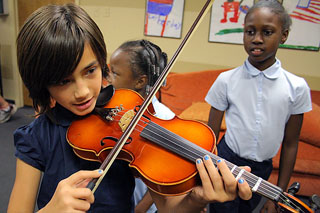
Monday, Mar 24, 2014
Media Release
City of Little Rock Public Relations (501) 371-6801
Community ProgramsStudies validate the ideology that the most effective practices to deter juvenile crime are preventive programs. According to the Princeton-Brookings Institute the most successful programs engage youth in pro-social behaviors and divert delinquent youth. These programs are community-based at a primary or secondary level. Primary level programs focus on areas such as smoking prevention, drug use, or teen pregnancy. Secondary, programs address youth who may be at an elevated risk of delinquency to include potential violence or other crimes.

(Our House Shelter after-school Neighborhood-Based Program works
with youth to provide activities that develop pro-social behavior.)
The Department of Community Programs contracts over 30 programs which meet the criteria of primary and secondary prevention. These programs are community-based addressing the needs of pre-adolescents and teens. Programs are strategically place-based on the developmental needs in the community. The programs match an overlay of risk factors across the City of Little Rock.
Secondary programs are identified as Youth Intervention Programs (YIP). These programs offer more intensive programming for elevated at-risk youth. YIP programs offer services which provide case management, and a more intimate level of resources for youth who may struggle in their current environment.
Primary programs are identified as Neighborhood-based programs (NBP). Neighborhood-based programs open doors to two age groups 6-11 and 11-17. Programs work with youth to develop pro-social behaviors. Many of the program sites address life skills, academic achievement, and positive social interaction.
In addition to the Neighborhood-based programs, Community Programs has implemented contracts with organizations to provide supplemental services to contracted organizations to provide programming in specialized areas of need such as introductions into STEM (Science, Technology, Engineering, and Math), mediation, and literacy. These programs are designed to bring along participants to be better prepared in the school and community environments.


 E-NEWS
E-NEWS
 EXPLORE
EXPLORE
 NEWS
NEWS
 TRANSLATE
TRANSLATE
